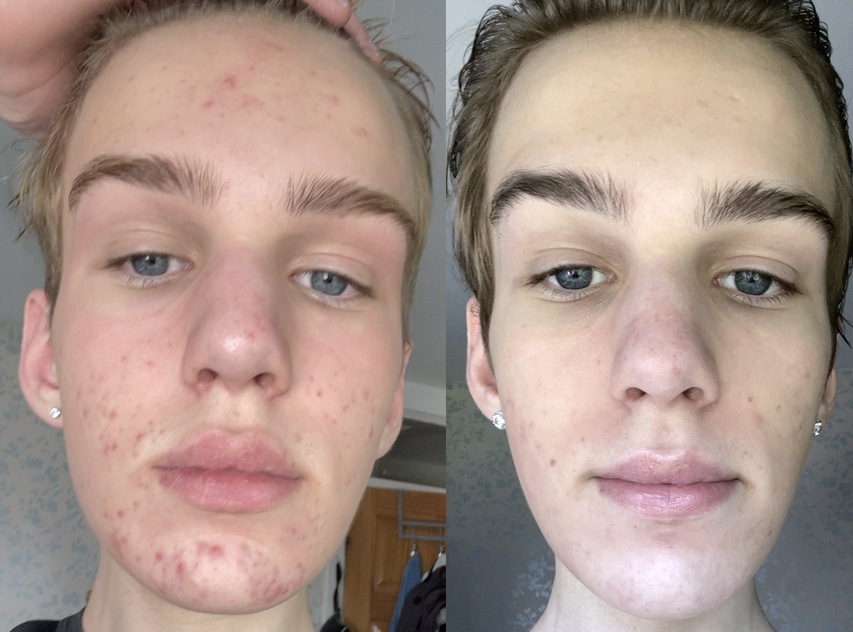The best acne treatment for teenage boys

Understanding the Causes of Teenage Acne
First things first—your acne is not your fault. It’s a natural part of growing up and understanding the causes can help you manage it better.
The Culprits Behind Teenage Acne
- Genetics: If your parents had acne, you’re more likely to experience it, too.
- Hormones: Hormonal changes during puberty lead to increased androgen production. This stimulates the sebaceous (oil) glands, making them larger and more active, which often results in acne.
Acne during puberty is common and, for many, inevitable. So don’t blame yourself or feel ashamed—there are solutions.

Young man with acne before and after MDacne treatment
Why Treat Teenage Acne?
While teenage acne is normal and often subsides with age, leaving it untreated can lead to:
- Emotional impacts like lower self-esteem and anxiety.
- Physical consequences like permanent acne scars.
Effective treatment can improve both your skin and overall quality of life.
How to Treat Acne in Teenage Boys
The best treatment for your acne depends on its severity. For mild to moderate acne, a good skincare routine with effective topical treatments can achieve significant results within a few months. Severe acne may require additional oral medications prescribed by a dermatologist.
Start with Topical Treatments
- Look for benzoyl peroxide and salicylic acid. These ingredients fight acne-causing bacteria, unclog pores, and reduce breakouts.
- Apply treatments to the entire acne-affected area, not just individual spots, to prevent future breakouts.
- Pro Tip: To find the right acne treatment for your unique skin, take the free MDace skin assessment. It will analyze your skin condition and customize an acne treatment plan with personalized products tailored to your acne severity, skin type, and sensitivities.
Avoid DIY Remedies
Forget toothpaste, rubbing alcohol, or exotic kitchen extracts. These hacks can irritate your skin or even cause burns. Stick to dermatologist-recommended ingredients and avoid undiluted essential oils like tea tree oil, which can be too harsh.
Be Patient
Acne treatments take time. You may see some improvement within a few weeks, but optimal results often take 10–12 weeks. Initial worsening (known as "purging") can happen but is temporary. Stay consistent, and don't give up too soon.
Be Consistent
Using acne treatments sporadically won't work. Make it a habit to follow your routine morning and night. Set reminders if needed, and keep your products in a visible place, like next to your toothbrush.
Handle Dryness Carefully
Dryness or irritation is common when starting acne treatments, especially for sensitive skin. If this happens:
- Reduce the frequency of use (e.g., every other night).
- Use an oil-free moisturizer to soothe your skin.
Lifestyle Tips for Acne Prevention
-
Hygiene:
- Wash your face twice daily, especially after sweating.
- Shower after exercise and wear clean clothes to avoid clogged pores.
- Avoid touching your face or picking at pimples.
-
Hair Products:
- Hair gels, sprays, and oils can clog pores if they come into contact with your skin. Opt for oil-free, non-comedogenic products.
-
Diet:
- Certain foods, like dairy (especially skim milk) and high-glycemic foods, can trigger acne.
- Whey protein supplements are another common culprit. Switch to protein alternatives like grass-fed meat, fish, or free-range eggs.
-
Shaving:
- Shaving can help unclog pores, but it’s essential to do it carefully to avoid irritation. Shave daily or every other day with a clean razor.
-
Body Acne:
- Over 50% of people with facial acne also experience body acne, especially on the chest, back, and shoulders. Use medicated cleansers and treatments specifically formulated for these areas.
Should You Consider Supplements?
Dietary supplements can complement your acne treatment. Look for:
- Vitamins A and B5 to reduce oil production.
- Zinc and selenium to fight inflammation.
- Niacinamide (Vitamin B3) to improve skin texture.
Customized acne supplements, like those offered by MDacne, combine these ingredients to target acne-causing factors while promoting skin health.
The best supplements for teens with acne
When to Consider Oral Medications
If your acne is severe, inflamed, or causing scars, and topical treatments aren’t working, it may be time to consult a dermatologist. They might prescribe:
- Oral antibiotics to reduce inflammation and bacteria.
- Accutane (isotretinoin), a powerful acne medication for severe cases. Note: Accutane can have significant side effects, so it should only be used under medical supervision.
Final Thoughts for Teenage Boys
For some teenage boys, acne may feel like a minor nuisance, but for others, it can be a painful and disruptive condition. Remember, you're not alone, and there are effective solutions available. With the right approach, you can achieve clearer skin and feel more confident.
To find the right acne treatments for your unique skin, take the free skin assessment by clicking here.



